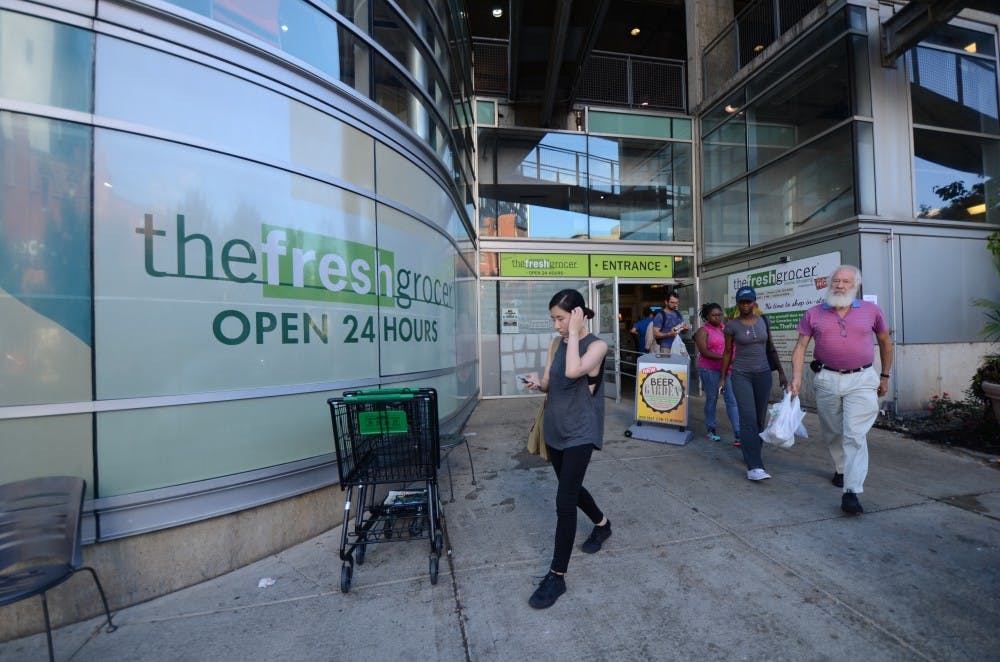
Director of the Krogman Growth Center and anthropology Professor Solomon Katz came up with a solution to the ongoing problem of food waste by creating new food-saving initiatives that could be implemented in West Philadelphia grocery stores.
Credit: Katie ZhaoA Penn professor is saving would-be wasted food and changing it into sustainable meals to help feed the hungry.
Around 30 to 40 percent of food in the United States goes to waste, according to the Johns Hopkins Center for a Livable Future. In response, Director of the Krogman Growth Center and anthropology professor Solomon Katz came up with a solution to this ongoing problem. He got together with faculty from Cabrini College and Drexel University to create a pilot program in West Philadelphia supermarkets that would allow for some of this wasted food to go to good use, summarizing findings in a July report.
“My role in it was to sort of spur it to start with, connect the dots or the people and also to create the structure of the reports,” Katz said.
In October 2013, the U.S. budget was sequestered, as the federal government could not decide on how to allocate it. As a result, the government decided that the Supplemental Nutrition Assistant Program, more commonly known as food stamps, would have to be cut substantially.
Katz got together with Tom O’Donnell from Cabrini and Jonathan Deutsch from Drexel to find a fix to this problem. The three came together through Katz’s seminar at Penn called “University of Pennsylvania Food Systems.” Katz met O’Donnell, who also works at the U.S. Economic Development Administration, when he attended the class, but he had known Deutsch previously from work he’d done for Katz’s encyclopedia, “Encyclopedia of Food and Culture.”
“We decided to all join in and see what we could do,” Katz said.
They knew that one of the hardest-hit areas by the food stamp cut would be West Philadelphia. Because of this, the group wanted to combat the local issue and use it as an example for other cities. They wanted to get the supermarkets that O’Donnell was already working with to come up with recipes that could make the food that would otherwise spoil into new products for homeless shelters.
Katz, O’Donnell and Deutsch then teamed up with Jeffrey Brown, head of Brown’s Super Stores in West Philadelphia. They took fruits and vegetables from his stores that would not make it to the shelters before spoiling and brought them to Drexel to “transform it into new foods,” Katz said.
Deutsch explained the idea behind their program to Philly Voice, saying, “If I offered you a bruised banana, you probably wouldn’t be interested. But if I offered you some banana ice cream on a hot summer day? I bet you’d find that more appealing.”
The scholars have since presented their findings at a number of different venues across the country and plan to use the pope’s visit later this month to streamline their goals and efforts. Since Pope Francis’ agenda addresses poverty and hunger, Katz says that this is a great opportunity “to engage and get the word out about what is going on, and also to create a playbook that they [visitors] can take back to their own communities as a way of engaging them in the process as well.”
“Our goal is, in essence, to create an opportunity for the people to make real contributions.”
Katz and his colleagues also plan to expand their current project even further by creating surveys of Philadelphia restaurants that students can help with. Their pilot survey will be focused on West Philadelphia restaurants and how they work on the problem of food waste as well.
“The question is coming up with practical solutions that will make economic sense, that will make moral sense, that help people to have food that they wouldn’t have ordinarily and to stress new kinds of recipes that take advantage of the natural nutrient properties of foods that are available,” Katz said.
The Daily Pennsylvanian is an independent, student-run newspaper. Please consider making a donation to support the coverage that shapes the University. Your generosity ensures a future of strong journalism at Penn.
DonatePlease note All comments are eligible for publication in The Daily Pennsylvanian.




